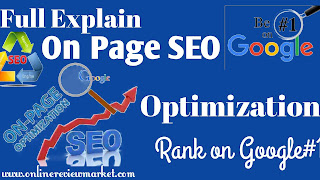 |
| What Is On Page Seo |
What is On Page SEO and how to increase traffic on website?
If you keep information about SEO then you will know what is on Page SEO. There is no doubt that internet is a very big noisy marketplace. There are millions of websites and blogs here, even in the hundreds of thousands of blogs being created every day. In such a way, creating a separate identity of the website itself is really a very difficult task. If there is no rank in the first page of the search engine then traffic becomes a big problem.You would think how to increase the traffic of your blog. On Page SEO, it is the only weapon that you can rank your website correctly, along with it can also make it visible in the internet.
Over the past few years, the "rules" on-page have changed to a great extent, because Google always wants to provide best results to its viewers. Now in a standard search result page, such pages are shown in which you might not find the exact match query or keyword in their title tag or meta description.
Now we are dealing with many ranking algorithms, in which Hummingbird, Panda, Rankbrain and semantic are the main pages. Now Google Ahista Ahista is becoming smart. In this case, your on-page strategies will also have to be improved.
There are many people who start their blog only but they do not know anything about SEO and how to implement them together.
When called in easy language, SEO is called Search Engine Optimization. These are called techniques that a blogger can implement in his web pages, easily rank his articles in google. And the better you rank, the more traffic you have on your blog.
Now, we can divide SEO into two separate categories; On-Page SEO and Off-Page SEO
On-Page SEO refers to all the things that you can do in your website so that it can easily be ranked in search engines, in it are page titles, internal linking, meta tags and descriptions.
Off-Page SEO is used to refer to everything you can do outside of your website and this will help you to rank higher in search engines. Social networking, article submission, forum and blog marketing are the main ones.
So today I thought why you should give all the information about what happens to On-Page SEO, and how you can use these On Page SEO techniques correctly in your blogs. Then without delay, let's start
What is On Page SEO?
On-page SEO (also called on-site SEO), these multiple components are referred to in a website to optimize that website correctly.The goal of this is to set up pages on the site so that they are visible in the top pages of search engines and can capture more traffic.
To do this, you have to optimize its content, architecture and HTML code.
Every factor of On-Page SEO is controlled by you in your website's interface. That is why it is very important to do it in the right way.
Where On-page refers to both the content and the HTML source code as a page, the Off-page SEO refers to links and other external signals. When both SEO techniques are used correctly, they will definitely help you to rank your pages higher in Google.
A user remains close to 8 secs in a new website, to interact with that website. The more interaction and engagement they will have, the more users in your site, the better they will experience.
If you implement the On Page SEO in the right way, you will surely see a boost in your blog's traffic.
How to do On Page SEO
On-Page SEO includes all those on-site technologies that you can implement in your webpages so that they rank above the SERP.It uses both content and technical elements to improve the quality of the page, so the more likely you are on-page SEO, the more chances that your website has more relevant traffic.
Well on Page SEO tutorial in Hindi there are many different technical aspects that can be optimized, in which they are main:
- Title tags
- Headings
- URL structure
- Alt text for images
- Site speed
- Internal links
- Meta descriptions
- Responsiveness
On Page SEO Techniques?
Now let's know about some of the best practices of On Page SEO. In On Page SEO techniques in english, we can use our article, so that we can easily do On Page SEO.Title Tags are called HTML elements that you use to name a webpage and these are displayed in SERPS as a clickable result title.
Each title tag should be unique, descriptive, together with information about the page that the page is about, they also have to optimize with a keyword and their length should be within 60 characters.
Headings are titles that you give to your content, and they should be in H1 format for better results. Headings should always focus more on relevant and descriptive words, with this they should optimize such keywords with keywords so that it does not look like stuff at all.
Together you can break your content in small portions, for that you can use subheadings (H2 to H6), but note that do not repetition much of keywords or phrases in post.
Importance of URL Structure increases when search engines determine how much more relevant a page is compared to a query, and it must be a little descriptive, according to the subject of the page. You can also optimize URLs with keywords, as long as they are relevant. For example, a better URL structure would be https://www.onlinereviewmarket.com/on-page-SEO
Alt text or alternate text search engines provide more information about an image, although it is used mostly to describe images for web visitors who can not see them.
Therefore, alt text should be very specific and descriptive for image content, it should be 125 characters or less, and it should optimize it by keyword or phrase only if it is appropriate.
Page load speed is very important because slow-loading pages have higher high bounce rates: It has been revealed from a survey that 47 people want their site to be opened within 2 to 4 secs, and about 40 Percentage only goes after 4 secs.
It has been observed that search engines penalize those slow-loading pages, from lower ranking, so be aware of the speed of your blog's speed.
Internal links, this helps visitors greatly navigate easily in the site, as well as help the search engines to understand your site and to index pages, so that you can easily higher rank. At least you can do so much, linking each page of your site with its category or subcategory page.
Meta descriptions are mostly short but different descriptions that expand in the title tags, summarize the content of the page and tell the web users why they should read your content in someone else's place. This meta description is visible below the title and the URL, it should be placed under 160 characters.
Responsiveness is a design element that ensures that your page will display correctly in any device, including mobile devices and desktops. This is going to be an important factor even further since people are slowly using mobile devices for online search.
Keyword: The one who has the highest importance is the keywords. It is like the eight that your on-page SEO strategy is tied to each other, they can be combined with all the technical elements, so that the right viewer can reach you in the right time.
In order to make them more effective, the keywords must be researched and together they will have to choose carefully, apart from this, they should be implemented in a very natural way in the content so that the stuffing problem does not arise.
Importance of Content in On-Page SEO?
Where technical aspects are important, there is a very crusial element of on-page SEO, because this is the thing that brings traffic to your site.But in the present time, there is no importance of content like this, but nowadays web users are always looking for relevant, interesting, engaging, and informative content that can meet their needs.
Well these types of contents are of many types, such as
- Link
- Blogs
- Web page copy
- Videos
- Infographics
- Podcasts
- Whitepapers
- Ebooks
- Interviews
- Case studies
- Original research
- Reviews
- Instructional articles
- Quizzes and poles
What is the difference between On Page SEO and Off Page SEO?
If you ask any SEO expert you will get the same answer that you need both on page SEO and off page SEO for the success of your blog. When everything comes to your blog's search engine ranking, then both of these things work very differently.So let's know what the difference between these two is. To understand this, you must go to the basic level of how the search engine works.
When the search engine is evaluating a site, then it mainly carries two things into the web.
1. On-page SEO This shows what your site (or your page) is about
2. Off-page SEO This shows how much your site is more authoritative and popular
Simply put, on-page factors are used to find out if you want to rank, so far you can rank, for this you have to use off-page factors.
Off-Page SEO is called set of factors that occur in other websites and that help improve your website's position in the search engine results page (SERPs).
Some major factors of off page SEO are?
- Links which are in other websites and point to your website
- Referring to your brand across the web
- User behavior and engagement in your website
- Shares in Social Media
The promotion of your website mainly in Off-Page SEO is considered in many ways in other websites. For example, promotion in link building and social media
Why is it important to have On Page SEO?
Most people have basic knowledge of SEO, in which they only place the keywords in the page on the page SEO. There is no doubt that the keywords for On Page Optimization are very important, but with it there are many more things that are important to know and implement.Soon you will find out about it, on-page optimization:
- keywords
- copywriting
- media
- links
- User Experience (UX)
- And conversions together.
- It is very important to understand and execute all on-page SEO factors correctly as this can only be ranked above you in google.
What is the importance of a User-Friendly Website in On-Page SEO?
On-Page factors include both front end (content) and backend (HTML code) of your site.Google's algorithm tracks your website's quality and user-friendliness, as well as how to:
1. Their bot crawler interacts with backend and
2. How do the real people interact with the front end
Before visiting other factors, let us know why a user friendly website keeps them tied together.
You can keep things in control in your site but you can not control how long users will stay in your site. A user-friendly website encourages human engagement.
If the content of the front end is not as much appealing, user-friendly and relevant then most people will go away in other websites.
So when you do On-Page SEO, then in your mind, worry that a user-friendly experience means that when someone comes to your website page then:
Links ...
- They should understand clearly what your webpage is about
- This page should be completed or relevant to their search intent (their search keywords)
- They should think that this page is very useful and it will also increase the ranking of the page.
What are Major Factors on On-Page SEO?
Well on-Page SEO has many factors but let us know about certain specific factors.Basically these factors can be divided into two parts, front-end and second is backend factors.
Front-End Factors:
These are called factors that are visible to users who come to visit the site. Let's know more about on this?- Value - Does your article provide value to users? Headline, topics, and images are main in these things.
- User Experience - Does your site load quickly? Is it easy to navigate? Can it be opened easily in any device?
- Keywords and Content - Are your keywords and content optimized for search? In other words, do you use keywords and phrases that are actually looking for users in search engine?
Backend Factors:
In the same backend, Google is making some opinions according to the relevance of your page, which includes some things like:- Bot-friendliness - Is your data organized so that Google's search engine bots are able to scroll them easily and know what subject they are for?
- • Metadata - Are there any information about your page in your HTML code? Such as meta descriptions, URLs, and title tags, etc.
- Mobile-friendliness - Does your site look optimally optimized for mobile? Is your site design responsive?
On Page SEO or Off Page SEO Who's More Important?
It is not right to say that On Page SEO is better than Off Page SEO, it is such a thing that the foundation of the house is more important or the roof On-Page and Off-Page SEO both work together and this can improve the search engine rankings.Like everything is different for a house, the same is the importance of the roof along with the foundation. Not only is it necessary to build a house but it is also necessary to maintain it from time to time.
It is therefore essential to give equal importance to everything in SEO.
Conclusion
I hope you have given me full information about people on What is On Page SEO in Hindi and hope you guys have understood about On Page SEOIf you have any doubts about this article in your mind or you want some improvement in it then you can write down comments for it. With your thoughts, we will get a chance to learn something and improve it.
If you have enjoyed this article or to teach you something, please share this post on social networks such as Facebook, Google+ and Twitter to show your happiness and curiosity.And Also Can visit our Website To View Another Article
Online Review Market










2 Comments
Great post i must say and thanks for the information. Education is definitely a sticky subject.thanks lot!!
ReplyDeleteandroid training in chennai
android online training in chennai
android training in bangalore
android training in hyderabad
android Training in coimbatore
android training
android online training
Great Blog!!! Was an interesting blog with a clear concept. And will surely help many to update them.keep it up!!
ReplyDeleteandroid training in chennai
android online training in chennai
android training in bangalore
android training in hyderabad
android Training in coimbatore
android training
android online training
Send your opinion.Please Dont Share Any Spam Link
Emoji